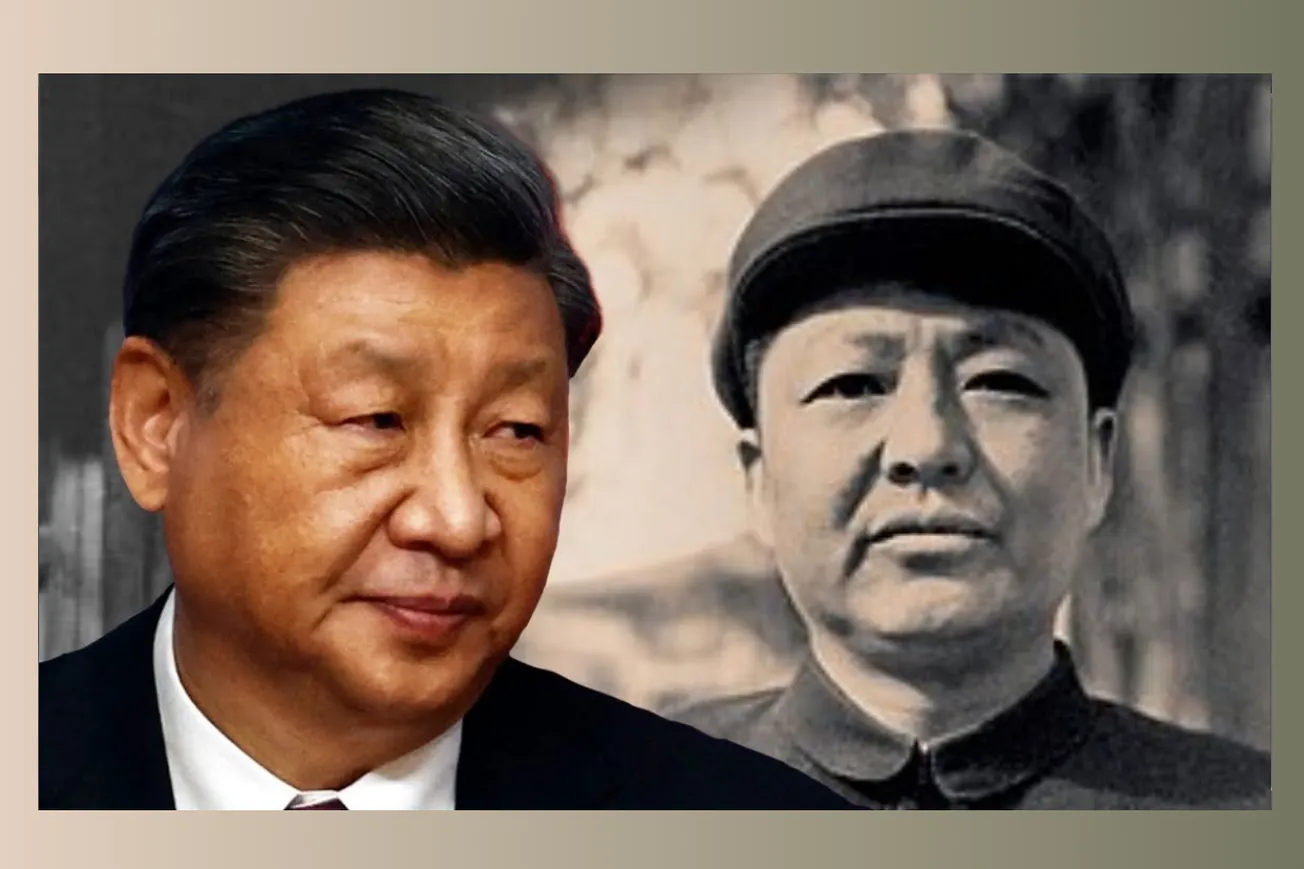Table of Contents
Joseph Torigian's biography of Xi Zhongxun exposes the psychological mechanisms through which the Chinese Communist Party transforms persecution into deeper devotion among its elite members.
Xi Zhongxun's 90-year life demonstrates how revolutionary organizations create religious-like attachment through trials of faith, making party loyalty stronger than family bonds or personal survival instincts.
Key Takeaways
- Xi Zhongxun's persecution by the CCP raised the question "how do I win back the party's trust?" rather than driving him away from the organization
- Revolutionary suffering became competitive advantage: "precisely because I am going through this torment, I am even more dedicated than other people"
- Party loyalty transcended family bonds: Xi Jinping couldn't "betray the party for which his father sacrificed so much"
- Religious parallels emerge through confession, self-criticism, and finding redemption through organizational suffering
- Generational challenge persists: "if you want them to eat bitterness, how do you do that without turning them away from the cause entirely?"
- Research methodology reveals 2,000+ sources despite Chinese government restrictions on sensitive historical materials
- Xi Zhongxun's life spans from 1913 rural poverty through Cultural Revolution persecution to 1989 Tiananmen Square decisions
- Northwestern revolutionary base area provided crucial sanctuary that enabled Mao's Long March survival and ultimate victory
Timeline Overview
- 00:00–18:45 — Research Methodology: Joseph Torigian explains "mosaic theory" approach to reconstructing sensitive Chinese political history from fragmented sources
- 18:45–35:20 — Early Revolutionary Formation: Xi Zhongxun's transition from failed teenage assassin to committed party member through imprisonment and ideological conversion
- 35:20–52:15 — Base Area Politics: Northwestern revolutionary dynamics, factional tensions, and Xi's emergence as youngest Central Committee candidate member
- 52:15–68:30 — Marriage and Personal Sacrifice: Revolutionary relationships subordinated to party interests, arranged marriages serving political goals
- 68:30–85:45 — Persecution and Loyalty: 16-year political exile from 1962-1978 strengthened rather than weakened Xi Zhongxun's party devotion
- 85:45–102:00 — Psychological Mechanisms: Analysis of how suffering creates competitive loyalty advantage within Communist Party culture
- 102:00–118:30 — Religious Parallels: Comparisons between Communist Party devotion and millenarian religious movements including self-criticism practices
- 118:30–135:00 — Generational Questions: Contemporary challenges of maintaining revolutionary fervor among youth without persecution experiences
Persecution Paradoxically Strengthens Party Devotion
- Xi Zhongxun's response to party persecution revealed organizational psychology: "when the party persecuted him, it didn't turn him away from the party. It raised a question for him, which was, how do I win back the party's trust?"
- Suffering became competitive political capital: "How do I show that precisely because I am going through this torment, I am even more dedicated than other people who didn't have to go through that"
- Politics of suffering created internal hierarchy: "when other people were grumbling about the party, Xi Jung would say, 'Yeah, well, I bet you didn't go through this.' It was almost like a badge of honor"
- Xi Jinping inherited this framework: "during the cultural revolution, he went through a period of doubt. But precisely because he wasn't sure for a little while and nevertheless return to the cause of the party. Therefore, his dedication is totally unshakable"
- Organizational loyalty transcended personal relationships: Xi Zhongxun "put the party's interest first and went along even with Deng's persecution of this very close associate of his"
- Contemporary relevance for youth management: "if you want them to eat bitterness, how do you do that without turning them away from the cause entirely? And that is a question that Xiinping thinks about all the time"
The persecution-loyalty dynamic reveals how revolutionary organizations can transform potentially alienating experiences into sources of deeper commitment. This psychological mechanism helps explain why Chinese Communist Party elites maintain devotion despite witnessing systemic failures and personal suffering.
Revolutionary Organizations Create Religious-Like Attachment
- Party membership provided existential meaning: "the party was the source of meaning in his life. It was this source of purpose. It was salvation. It was a place where a young boy growing up in a society that was rent by turmoil found an answer"
- Organizational transformation methods parallel religious practices: "you have self-criticism, you have study sessions. And so if you believe that you are participating in a grand adventure by which you are a leading figure in a world historical force"
- Confession campaigns mirrored religious rituals: "confession self-criticism thing which is like a central part of these guys lives is this introspection and these doctrinal fights of like who has the right line"
- Martyrdom culture encouraged ultimate sacrifice: "Leo Jadan because he still has this black mark in his file, wants to show how loyal he is, gets himself killed"
- Soviet parallels demonstrate universal patterns: "just like when during the terror in the Soviet Union people were sent to their execution they were yelling long live Stalin during the cultural revolution these old revolutionaries had no idea what Mao wanted"
- Individual conscience subordinated to organizational conscience: "the gospel is a message of individual conscience and the party is a message of your conscience being the party's conscience"
The religious parallels suggest that Communist Party loyalty operates through spiritual rather than merely political mechanisms. This helps explain the persistence of devotion even when rational cost-benefit analysis would suggest abandonment of the organization.
Generational Challenge of Maintaining Revolutionary Fervor
- Historical experience created advantages for persecution survivors: Xi Zhongxun "thinks that the young people who went through the cultural revolution might be a good group of successors because they underwent these terrible experiences"
- Contemporary youth lack formative struggles: leaders worried that young people were "flowers in a hothouse garden" who "need to go out into the real world so that they can survive in the real world"
- Proposed solutions involved storytelling: "we just need the old comrades to go into the high schools and tell their stories. Sort of like the astronaut showing up in middle school"
- Cultural Revolution served succession purposes: "getting rid of Liu Shaoqi, the revisionist, but also toughening young people who had been growing up in the privilege of a youth in a socialist nation"
- Xi Jinping consciously differentiated himself: "consciously contrasted himself with those other youth and he saw a lot of danger in this spiritual crisis that many young people in China found themselves in the 1980s"
- Current leadership grapples with motivation: contemporary question remains "how do you do that without turning them away from the cause entirely?"
The generational challenge reveals fundamental tensions in revolutionary movements: the experiences that create devoted leaders may not be replicable without undermining the system's stability and legitimacy.
Research Methodology Overcomes Information Restrictions
- Mosaic theory enables reconstruction from fragments: "I don't really think in terms of good and bad evidence. I think in terms of getting as much evidence as possible and then parsing it"
- Archive access requires creative approaches: "There were some very interesting document collections published in Hong Kong as well as memoirs and party history written by insiders"
- Foreign sources provide crucial verification: "I made a list of every time Xi Junction met with a foreigner and then I went to speak to that foreigner or I went to their archives which are open"
- Tibetan language materials offered unique perspectives: "I was able to get these Tibetan language transcripts of negotiations between Dharamsala and Xi Jung in Beijing and have them translated into English"
- Official sources contain valuable information despite limitations: "there are cases where they change the literal words that people said but they're quite rare. More often the problems are what they don't include"
- Serendipitous discoveries drive breakthroughs: "there was some complete stroke of luck where I was looking at something completely different or I was going for a long walk and I said, maybe I should go back and reread this"
The research methodology demonstrates how scholars can reconstruct sensitive political history through triangulation of diverse sources, even under authoritarian information restrictions. This approach enables deeper understanding of closed political systems.
Marriage and Personal Life Subordinated to Revolutionary Goals
- Revolutionary matchmaking served political purposes: "relationships were seen as something that should be built on the principles of what facilitates the revolution"
- Party interests overrode romantic preferences: "there was a lot of very forceful party matchmaking during this period. These relationships were seen as something that should be built on the principles of what facilitates the revolution"
- Xi Zhongxun's courtship reflected organizational priorities: arranged meetings where "they all start pointing to Xi Jongun and they say this is the guy" leading to hasty marriages
- First wife's revolutionary dedication created conflicts: "She's someone who didn't join the revolution to get pregnant. She joined the revolution to make revolution. And it's that tension that apparently led to a break"
- Qi Xin relationship demonstrated party-first mentality: "he tells her, 'Why are you coming to see me? We're in the middle of fighting this war. It's just a distraction'"
- Family dynamics reflected organizational culture: Xi Jinping and siblings "just don't do parenting for like six days a week" due to party commitments
The subordination of personal relationships to revolutionary goals demonstrates how totalizing ideological movements reshape basic human bonds. This pattern helps explain contemporary Chinese leadership's approach to balancing individual desires with organizational demands.
Northwest Revolutionary Base Area Proved Strategically Crucial
- Geographic isolation provided protection: "the Northwesterners had great pride in the fact that almost all of the base areas had been destroyed except for theirs"
- Accidental discovery enabled Long March conclusion: "Mao didn't even know it was there. The party center learned about the existence of this base area because of a newspaper in some dusty town"
- Factional tensions shaped future politics: "there was a lot of infighting in all of these base areas that was quite severe. And so there were a lot of grudges and antagonisms"
- Leadership succession created ongoing conflicts: "there wasn't a clear leader who emerged from it" leading to "potential for all of these struggles that would emerge in subsequent years"
- Mao's patronage strategy leveraged regional dynamics: "he gives so many positions to them in 1945 at the seventh party congress that Mao's old associates from the Jiangxi base area are very jealous"
- Long March arrival created cultural tensions: "the Long Marchers show up and they think they're kind of a bunch of bumpkins. And the Northwesterners feel, well, we built this base area"
The Northwest base area's role reveals how geographic factors and local political dynamics can determine the fate of revolutionary movements. Understanding these regional foundations helps explain subsequent factional politics within the Chinese Communist Party.
Confession Campaigns Demonstrate Organizational Control Mechanisms
- Rectification evolved into persecution: "rectification turns into something called the confession movement or the rescue the fallen campaign and now it's looking for spies"
- Educational transformation became political investigation: "now it's just an issue of taking these young people and turning them into good communists it's finding which ones of them are spies"
- Xi Zhongxun's participation despite personal experience: "he himself had been persecuted largely on trumped up charges that had been a result of people being forced to give false confessions"
- Mass rally spectacles created public pressure: "they have these mass rallies where these young people go up and they lie about having been spies"
- Sexual accusations heightened emotional stakes: "lurid details about many of the young women spies allegedly being sent by nationalists to infiltrate the party by essentially being honey traps"
- Personal relationships formed during campaigns: Xi Zhongxun and Qi Xin "first start to get to know each other" during the Suide confession movement
The confession campaigns reveal how revolutionary organizations use psychological pressure and public shame to maintain control while identifying loyalty and extracting compliance from members.
Historical Nihilism Concerns Drive Contemporary Information Control
- Xi Jinping's speech linking historical narrative to regime survival: "one of the reasons they collapse is they lost control of their history and nobody took it seriously anymore"
- Historical nihilism as political threat: "he has this term of historical nealism that he uses to describe people who talk about the party's mistakes too much"
- Narrative control serves legitimacy purposes: "if you want people to think that the party is an inevitability, that it just goes from one triumph to another, the more you talk about its dark past, the more dangerous that is"
- Research challenges from information restrictions: writing about sensitive topics "is certainly something that is challenging" given contemporary political sensitivities
- Scholarly methodology adapts to constraints: "eating sawdust that China hands have used where you need to eat a lot to get any protein. So 99.9999999% of everything I read is totally useless"
- Moral obligation drives historical documentation: "people are dying and we're writing about why these people are dying. So we should feel a sense of moral obligation to do everything we can to get these stories right"
The information control concerns demonstrate how authoritarian regimes understand the political importance of historical narratives in maintaining legitimacy and controlling public opinion.
Common Questions
Q: Why did Xi Zhongxun remain loyal to a party that persecuted him?
A: The party was his source of meaning and salvation; persecution became a test to prove even greater dedication.
Q: How does suffering create stronger Communist Party loyalty?
A: Those who survive persecution can claim superior dedication and use their experience as political capital within the organization.
Q: What parallels exist between Communist Party and religious devotion?
A: Both use confession, self-criticism, martyrdom, and subordination of individual conscience to organizational authority.
Q: How do researchers study sensitive Chinese political history?
A: Through "mosaic theory" - gathering fragments from diverse sources including foreign archives, memoirs, and official materials.
Q: What challenges does the CCP face with younger generations?
A: Maintaining revolutionary fervor without persecution experiences that historically created devoted party members.
Xi Zhongxun's biography reveals the psychological mechanisms through which revolutionary organizations transform potential alienation into deeper devotion. His life demonstrates how the Chinese Communist Party creates religious-like attachment that transcends rational self-interest and family loyalty, providing crucial insights into contemporary Chinese political culture under Xi Jinping's leadership.
Practical Implications
- For Political Scientists: Understanding authoritarian resilience requires analyzing psychological rather than merely institutional mechanisms of control
- For China Analysts: Contemporary CCP behavior reflects generational experiences of persecution and survival rather than purely strategic calculations
- For Historians: Sensitive political biography requires innovative methodologies combining diverse sources to overcome information restrictions
- For Leadership Studies: Revolutionary organizations create loyalty through controlled adversity and competitive suffering rather than material rewards
- For Policy Makers: Chinese Communist Party elite psychology operates through spiritual devotion mechanisms that rational incentives may not effectively influence
- For Researchers: "Eating sawdust" methodology enables breakthrough insights when applied with patience and systematic triangulation approaches





